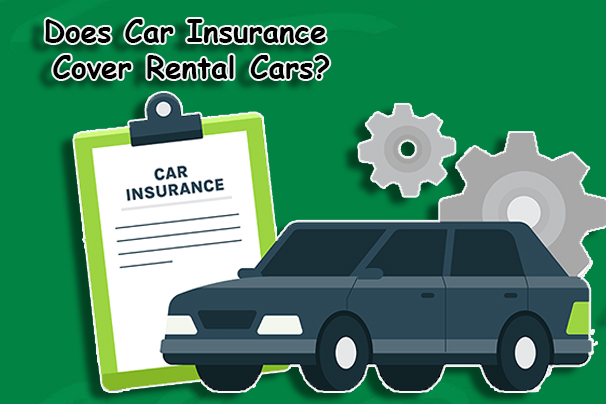Does Car Insurance Cover Rental Cars? Most of the time, rental automobiles are covered by your auto insurance. You might not require extra coverage if your policy covers liability, comprehensive, collision, medical payments (MedPay), and personal injury protection (PIP). However, certain exclusions might be applicable, or you might have coverage gaps that need a separate policy. That is why it’s crucial to check your coverage before renting a car.

Understanding your car insurance policy’s limits and deductibles is crucial as they apply to claims covering rental cars. Auto insurance may have additional restrictions on coverage for specific uses, situations, and losses. Furthermore, before renting a car, it’s crucial to consult your insurance company or agent to determine the coverage of your auto insurance policy.
What Does Car Insurance Cover for Rental Cars?
Car insurance follows the vehicle, not the driver. However, it does not apply when you are renting a vehicle for personal use. Rental automobiles would be covered by your auto insurance. Moreover, if you do not need extra coverage for rental cars, make sure the following kinds of coverage are included in your current policy first:
Liability coverage
If your rental car is involved in an accident that results in property damage or injuries to other people, liability coverage will shield you. The liability insurance on your car policy most likely already covers this.
Collision and comprehensive coverage
Comprehensive insurance covers various types of car damage, including theft, and offers two types of coverage for your protection. When your car is involved in an accident with another vehicle or object, collision insurance will pay for repairs. If you have a car loan, your lender likely requires you to have both types of insurance in your policy.
Personal injury protection (PIP) and medical payments (MedPay)
This type of insurance covers damages resulting from a collision, including missed income, child care expenses, and burial expenses. It also covers medical costs for you and your passengers. PIP and MedPay are mandatory insurance policies in many states, allowing payout regardless of culpability, unlike liability insurance.
Furthermore, you can use the coverage options listed in your personal car insurance policy when renting a vehicle. They should be viewed as the absolute minimum required in order for you to properly decline the rental insurance.
How Do I Know If My Car Insurance Can Cover Rental Cars?
Before signing any rental car agency paperwork, ensure your car insurance covers rental cars by calling your agent. Your insurance probably won’t cover rental cars if you get into an accident or damage the vehicle. This is if you don’t have liability, comprehensive, and collision coverage on your own vehicle.
The reason for the trip is a crucial consideration when determining whether your car insurance will cover rental cars. If your personal auto insurance doesn’t cover business use, you won’t be covered when you hire a car for a work trip. Double-check your auto insurance policy before accepting or refusing insurance at the rental office to ensure adequate coverage.
Should I Get Rental Car Insurance?
It might not be necessary to get rental car insurance if you already have car insurance or coverage for rental cars through your credit card. However, there are a few situations where purchasing additional rental car insurance might be advantageous and worthwhile:
Have large deductibles
When compared to a high deductible with your personal auto policy, rental car insurance coverage frequently has no or low deductibles, meaning you could pay much less or nothing in the event of a claim.
Prevent claims on your auto insurance
In addition, to prevent a possible rate increase on your personal auto policy, you would file a claim with the rental car company when you have insurance.
You don’t have collision or comprehensive coverage
You can be protected against physical damage to your rental car by adding a loss-damage waiver if your personal auto policy does not include collision or comprehensive coverage.
Low liability coverage limit
If your auto policy has the state minimum liability limit, renting additional coverage from the rental company will provide you with more protection in the event that you are at fault for an accident.
You’re traveling
The majority of American auto insurance only offers coverage within the country. Renting car insurance is crucial when traveling to a country where your personal insurance policy lacks coverage.
Final Thought
If you have existing homeowners’ and health insurance policies that match the counter-offered coverage or have comparable coverage through your personal insurance policy, you may not need rental car insurance. If you have no other choice or need to cover any gaps in your current policies, it might be worthwhile, though. Also, consider getting the CDW from the rental car company to cover damages if you have car insurance but not comprehensive or collision. It’s a good idea to compare rates from several rental car companies before heading to the counter.



